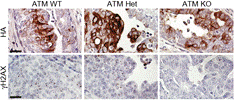Veterinary and Biomedical Sciences, Department of
Document Type
Article
Date of this Version
2010
Citation
Journal of Neuroimmunology (2010) 219: 17-24. DOI: 10.1016/j.jneuroim.2009.11.006
Abstract
We report here that an epitope (aa, 83-95) derived from Acanthamoeba castellanii (ACA) induces clinical signs of experimental autoimmune encephalomyelitis (EAE) in SJL/J mice reminiscent of the disease induced with myelin proteolipid protein (PLP) 139-151. By using IAs/tetramers, we demonstrate that both ACA 83-95 and PLP 139-151 generate antigen-specific cross-reactive CD4 T cells and the T cells secrete identical patterns of cytokines and induce EAE with a similar severity. These results may provide insights into the pathogenesis of multiple sclerosis and ACA-induced granulomatous encephalitis.
Included in
Biological Phenomena, Cell Phenomena, and Immunity Commons, Immune System Diseases Commons, Immunopathology Commons, Medical Biochemistry Commons, Medical Molecular Biology Commons, Nervous System Diseases Commons



Comments
Copyright 2010, Elsevier. Used by permission.